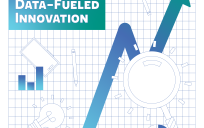I recently joined a convening of chief data officers from across different parts of the US government (federal; state; and local). The event brought together an an earnest group of like minded data evangelists, all dedicated to making their own institution more data-driven and output focused. Conversations that evening showed that they knew how to draw support from one another, but also revealed a number of consistent challenges and strategic constraints across government contexts. Many of these obstacles to data-driven government are deeply rooted, and can seem intractable. But there is clearly a desire for novel solutions, and one smart place to look is the nonprofit sector. In the uphill struggle for more data-driven governance, the insider’s best resource might just be experience, expertise and methods that have been developed outside of government. This can help both with nuanced thinking about public safeguards, and strategic thinking about institutional change.
Civil Society Flashbacks
Much of the discussion between chief data officers was remarkably familiar. Complaints about senior staff indifference and systemic illiteracy gave me flashbacks to talking with large NGOs and INGOs 7 or 8 years ago, before the data meme became hip enough to translate into HR strategies and budget allocations. It might not be surprising to find that kind of institutional lag within government. But it was a little surprising to see that lag combined with such cutting edge thinking. What the State Department is looking to do with blockchain is truly inspired. The institutionalization of data trusts to facilitate data sharing across institutions really is cutting edge institutional practice.
In some ways, this work is more impressive than its civil society counterpoint, because it is pursued within such significant constraints. Government can feel as though it is built to inhibit internal innovation. The roadblocks are numerous and have been part of the institutional landscape for ages. The Paperwork Reduction Act is one notorious example. It was devised with the best of intentions before pre-digital era. Now it’s a headache for government programs that want to collect large amounts of digital information, or even to conduct UX testing for digital services.
There are many such regulatory obstacles, often built deep into the DNA of government institutions. What’s more, the data-inspired among us must also navigate political obstacles like institutional data literacy and the turf battles that so often impede novel collaboration. It sounds like a recipe for burnout, but this group of data officers was inspired.
The Next Big Thing
So how do data evangelists stay focused? At least in part through magical thinking, I’d argue. They do it by tempering their work with the hope that it can trigger an institutional cascade towards data-driven government. They hope that solving abstract challenges like data literacy or “leadership” will unleash all that latent skill and good will in government. They hope all this will tilt towards something a lot more data driven.
Listening to the discussions between government insiders, I was struck by their conviction that this kind of change is inevitable. There was a persistent sense that the groundwork must simply be laid to usher it in. One participant understood their mission as “being ready for the next big thing.” She described the incredible power of the two words “machine readable” that. She noted that when those words were suddenly added to the end of every relevant policy sentence nearly ten years ago, they universally and immediately changed the way government related to open data. What are the next two words that will change everything?, she asked. She encouraged the group to be on the lookout and to be ready for that “next big thing.”
The Problem with the Next Big Thing
Unfortunately, it’s not at all clear what those next magic words will be. And things like data literacy and leadership are a lot easier to define in their absence than to outline as proactive strategies. So broad agreement about these types of challenges is likely good for solidarity and morale. But it doesn’t clearly map a way forward. Another challenge is that vague ambition towards turnkey solutions will often emphasize dynamics of efficiency, at the expense of thinking on equity.
This is not new. Big picture systemic thinking often becomes categorical at the expense of individual cases and a nuanced approach to public safeguards. Things like the ethical issues related to data access, data retention and data subjecthood are often infinitely deferred by data evangelism. This is because they’re difficult and because they require operationalization at the level of program design. That can run at odds with creating broad institutional incentives towards digitization. But nuanced thinking about public safeguards becomes more difficult as programs and mandates are established. This too we’ve seen in the non profit sector. These issues need to be built early into institutional thinking about capacity, training and evangelism. Doing so can feel like putting on the breaks. But it matters immensely for the people data-driven government aims to serve, and will be a tremendous asset when the next big cascade does finally hit.
Thinking outside the box, outside of the box
Few would disagree that the hunt for turnkey solutions in government needs to be balanced with careful thinking about data’s effects on the public and on individuals. But it’s easy to say and hard to do, especially when working within the tight institutional confines of government. The nonprofit sector represents a significant and widely under-utilized resource for creative thinking about how to do this.
Deliberate and progressive thinking on public safeguards for governance data is being led by think tanks and non-profits. Institutions like Data & Society, the GovLab, and Responsible Data Forum are regularly crafting and testing innovative but workable solutions for a variety of institutional contexts. There are clearly no silver bullets. But finding smart ways to engage will expand the toolbox that data evangelists have at their disposal.
Reaching outside of government to think strategically has other advantages as well. Recent digitalization experiences from large organizations like Oxfam may speak directly to many of the institutional and cultural challenges facing government data evangelists. These organizations also host international civil society thinkers. They leverage tremendous amounts of experience in supporting institutional advocacy and in strategizing systems change. Process facilitators like Aspiration have smart models for interfacing with these kinds of actors. They’re also well positioned to inspire and spur new ideas about how to move the needle in intractable contexts.
There’s a million ways to engage with these types of expertise. Conferences and events have a relatively low threshold, as do online groups and dialogues. Less structured engagement might make more sense to start. But some active effort to bring in experiences from outside of government is important. It might even resemble the kind of turn key, cascade-provoking actions that government insiders are after.
Moving ahead
Government is able to innovate when the context is right. Adding fresh insights and relevant experience from the nonprofit sector might help to improve that context. At the very least it can spur creative thinking about how to address the most intractable challenges to data-driven government.
The potential is huge, whether this kind of input would be used to pursue change radically or incrementally. Whether it is used to look for turn-key or ad hoc solutions, to hold dinners or workshops with post-it notes, expertise outside of government is an underutilized asset. A strong community of likeminded data evangelists within government is important. Having steady input from outside the black box of government will make that community stronger.





Leave a Reply
You must be logged in to post a comment.